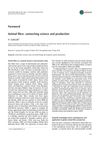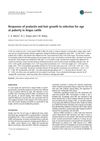75 citations,
September 2007 in “Journal of Heredity” FGF5 gene mutations cause long hair in domestic cats.
 6 citations,
January 2017 in “Annals of Dermatology”
6 citations,
January 2017 in “Annals of Dermatology” More exercise might link to hair loss, but other factors also matter.
 May 2022 in “Rossijskij žurnal kožnyh i veneričeskih boleznej”
May 2022 in “Rossijskij žurnal kožnyh i veneričeskih boleznej” Alopecia areata is complex, often recurring, and needs personalized treatment, especially with other health issues.
 253 citations,
March 2006 in “The Journal of Clinical Endocrinology and Metabolism”
253 citations,
March 2006 in “The Journal of Clinical Endocrinology and Metabolism” Exposure to too much androgen before birth might cause polycystic ovary syndrome later in life.
 April 2023 in “Medizinische Genetik”
April 2023 in “Medizinische Genetik” New research has found 14 genes linked to the risk of developing alopecia areata, improving understanding and treatment options.
 62 citations,
January 2010 in “Hormone research in paediatrics”
62 citations,
January 2010 in “Hormone research in paediatrics” Genetic screening is crucial for accurately diagnosing APS-1 due to its varied symptoms.
 1 citations,
March 2022 in “bioRxiv (Cold Spring Harbor Laboratory)”
1 citations,
March 2022 in “bioRxiv (Cold Spring Harbor Laboratory)” Low-coverage sequencing is a cost-effective way to identify genes related to wool traits in rabbits.
 16 citations,
January 2013 in “Indian Journal of Dermatology, Venereology and Leprology”
16 citations,
January 2013 in “Indian Journal of Dermatology, Venereology and Leprology” New treatments and early diagnosis methods for permanent hair loss due to scar tissue are important for managing its psychological effects.
 17 citations,
June 2017 in “Gene”
17 citations,
June 2017 in “Gene” A rare genetic mutation found in an Indian family can be detected through prenatal screening.
 2 citations,
August 2020 in “Scientific reports”
2 citations,
August 2020 in “Scientific reports” Genes related to keratin, skin cell differentiation, and immune functions are key in hedgehog skin and spine development.
 4 citations,
January 2010 in “Animal”
4 citations,
January 2010 in “Animal” Improving knowledge and practices in animal fibre production is crucial to meet market demands and potentially revive natural fibres.
 January 2009 in “Egyptian Journal of Medical Human Genetics”
January 2009 in “Egyptian Journal of Medical Human Genetics” The study suggests that a specific gene variation and higher gene activity are linked to increased baldness in Egyptian men.
100 citations,
November 2017 in “EMBO Reports” Metabolic signals and cell shape influence how cells develop and change.
1 citations,
November 2023 in “Biomedicines” Menopause can cause hair thinning and texture changes due to hormonal and metabolic shifts.
 32 citations,
August 1999 in “Journal of Investigative Dermatology”
32 citations,
August 1999 in “Journal of Investigative Dermatology” Early onset hair loss linked to genetics and androgen levels.
 1 citations,
January 2009 in “Elsevier eBooks”
1 citations,
January 2009 in “Elsevier eBooks” Anorexia Nervosa and Bulimia Nervosa are complex eating disorders with increasing incidence among young females, significant morbidity, and varying mortality rates, requiring more research for better treatment.
 January 2021 in “bioRxiv (Cold Spring Harbor Laboratory)”
January 2021 in “bioRxiv (Cold Spring Harbor Laboratory)” Mothers have more hair proteins than their children, with age-related differences in protein patterns, and some proteins in hair could indicate early childhood development.
 26 citations,
February 1998 in “Chemico-Biological Interactions”
26 citations,
February 1998 in “Chemico-Biological Interactions” Scientists identified three genes important for processing certain brain chemicals, thyroid hormones, and medications.
 January 2025 in “Clinical Cosmetic and Investigational Dermatology”
January 2025 in “Clinical Cosmetic and Investigational Dermatology” Genetic testing is crucial for diagnosing rare hair loss disorders.
 10 citations,
October 2008 in “Andrologia”
10 citations,
October 2008 in “Andrologia” Finasteride changes antioxidant enzyme expression, possibly affecting sperm protection in rats.
 30 citations,
June 2019 in “Frontiers in Endocrinology”
30 citations,
June 2019 in “Frontiers in Endocrinology” The document concludes that managing non-classical congenital adrenal hyperplasia in females requires personalized treatment, genetic counseling, and a team of specialists.
 1 citations,
January 2022 in “Cell Biology International”
1 citations,
January 2022 in “Cell Biology International” Changing CDK4 levels affects the number of stem cells in mouse hair follicles.
 6 citations,
September 2010 in “Animal”
6 citations,
September 2010 in “Animal” Selecting Angus cattle for earlier puberty lowers prolactin levels but doesn't affect hair growth.
 February 2023 in “Research Square (Research Square)”
February 2023 in “Research Square (Research Square)” Genetic testing confirmed a rare skin disorder in a young girl, which improved with zinc supplementation.
January 2025 in “European Journal of Pharmacology” Forsythoside A may help treat hair loss by blocking specific channels.
30 citations,
October 2010 in “Biochemical and biophysical research communications” The Gsdma3 gene is essential for normal hair development in mice.

Hidradenitis Suppurativa has genetic links, with certain gene mutations more common in patients and a third of cases having a family history.
 9 citations,
January 2020 in “Postepy Dermatologii I Alergologii”
9 citations,
January 2020 in “Postepy Dermatologii I Alergologii” Frontal fibrosing alopecia is a poorly understood condition with increasing cases and unclear treatment effectiveness.
22 citations,
March 2017 in “Journal of the Formosan Medical Association” The guidelines help doctors manage skin problems from certain cancer treatments to improve patients' lives.
 113 citations,
June 2019 in “F1000Research”
113 citations,
June 2019 in “F1000Research” Scarless healing is complex and influenced by genetics and environment, while better understanding could improve scar treatment.























